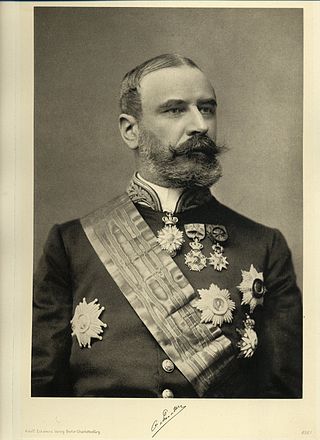
The House of Representatives is the lower house of the bicameral Parliament of Australia, the upper house being the Senate. Its composition and powers are set down in Chapter I of the Constitution of Australia.

The 1983 United Kingdom general election was held on Thursday 9 June 1983. It gave the Conservative Party under the leadership of Margaret Thatcher the most decisive election victory since that of the Labour Party in 1945, with a majority of 144 seats and the first of two consecutive landslide victories.

The Anti-Revolutionary Party was a Protestant conservative and Christian democratic political party in the Netherlands. The party was founded in 1879 by Abraham Kuyper, a neo-Calvinist theologian and minister who served as Prime Minister between 1901 and 1905. In 1980 the party merged with the Catholic People's Party (KVP) and the Christian Historical Union (CHU) to form the Christian Democratic Appeal (CDA).

The House of Representatives is the lower house of the bicameral parliament of the Netherlands, the States General, the other one being the Senate. It has 150 seats, which are filled through elections using party-list proportional representation. The house is located in the Binnenhof in The Hague; it has temporarily moved to the former building of the Ministry of Foreign Affairs at Bezuidenhoutseweg 67 in The Hague while the Binnenhof is being renovated.
A minority government, minority cabinet, minority administration, or a minority parliament is a government and cabinet formed in a parliamentary system when a political party or coalition of parties does not have a majority of overall seats in the legislature. It is sworn into office, with or without the formal support of other parties, enabling a government to be formed. Under such a government, legislation can only be passed with the support or consent of enough other members of the legislature to provide a majority, encouraging multi-partisanship. In bicameral legislatures, the term relates to the situation in the chamber whose confidence is considered most crucial to the continuance in office of the government.

The 1918 United Kingdom general election was called immediately after the Armistice with Germany which ended the First World War, and was held on Saturday, 14 December 1918. The governing coalition, under Prime Minister David Lloyd George, sent letters of endorsement to candidates who supported the coalition government. These were nicknamed "Coalition Coupons", and led to the election being known as the "coupon election". The result was a massive landslide in favour of the coalition, comprising primarily the Conservatives and Coalition Liberals, with massive losses for Liberals who were not endorsed. Nearly all the Liberal MPs without coupons were defeated, including party leader H. H. Asquith.
A snap election is an election that is called earlier than the one that has been scheduled. Snap elections in parliamentary systems are often called to resolve a political impasse such as a hung parliament where no single political party has a majority of seats, or when the incumbent prime minister is defeated in a motion of no confidence, or to capitalize on an unusual electoral opportunity or to decide a pressing issue, under circumstances when an election is not required by law or convention.
A hung parliament is a term used in legislatures primarily under the Westminster system to describe a situation in which no single political party or pre-existing coalition has an absolute majority of legislators in a parliament or other legislature. This situation is also known as a balanced parliament, or—for local government in the United Kingdom—a parliament under no overall control (NOC). A hung parliament may result in a coalition government, a minority government, or a snap election if a government cannot be formed.
The Catholic Party was a Belgian political party established in 1869 as the Confessional Catholic Party.
In parliamentary politics, balance of power is a situation in which one or more members of a parliamentary or similar chamber can by their uncommitted vote enable a party to attain and remain in minority government. The term may also be applied to the members who hold that position. The members holding the balance of power may guarantee their support for a government by either joining it in a coalition government or by an assurance that they will vote against any motion of no confidence in the government or will abstain in such a vote. In return for such a commitment, such members may demand legislative or policy commitments from the party they are to support. A person or party may also hold a balance of power in a chamber without any commitment to government, in which case both the government and opposition groupings may on occasion need to negotiate for that person's or party's support.

Full general elections were held in Belgium on 14 October 1894, with run-off elections held on 21 October 1894.

Partial legislative elections were held in Belgium on 22 May 1898, with run-off elections held on 29 May. Under the alternating system, elections for the Chamber of Representatives were held in only four out of the nine provinces: Hainaut, Limburg, Liège and East Flanders. Thus, only 75 seats out of the 152 seats in the Chamber of Representatives were up for election. The Catholic Party retained their absolute majority.

Full general elections were held in Belgium on 27 May 1900. They were the first elections under a proportional system instead of a majority system, with Belgium becoming the first country in the world to adopt proportional representation for parliamentary elections. Single-member constituencies were replaced with multi-member constituencies of between three and eighteen seats.
Full general elections were held in Belgium on 2 June, 1912.

Partial general elections were held in Belgium on 8 June 1847. The result was a victory for the new Liberal Association, which had been formed the previous year. It won 33 seats to the Catholics' 21, as the latter were split into dogmatic and liberal groups. Only 1% of the country's population was eligible to vote.

General elections were held in Belgium on 10 December 1857, the first full general elections since 1848. The elections were called by royal order of 12 November 1857, dissolving the Chamber of Representatives that had convened in a new session only two days earlier.

Partial general elections were held in Belgium on 14 June 1859. The result was a victory for the Liberal Party, which won 69 of the 116 seats in the Chamber of Representatives and 31 of the 58 seats in the Senate. Voter turnout was 55.9%, although only 49,672 people were eligible to vote.

Legislative elections were held in Belgium in June and July 1884, for partial Chamber and full Senate elections respectively. Voter turnout was 79.1% in the Chamber of Representatives elections, although only 69,276 people were eligible to vote.
A landslide victory is an election result in which the winning candidate or party achieves a decisive victory by an overwhelming margin, securing a very large majority of votes or seats far beyond the typical competitive outcome. The term became popular in the 1800s to describe a victory in which the opposition is "buried", similar to the way in which a geological landslide buries whatever is in its path. A landslide victory for one party is often accompanied by an electoral wipeout for the opposition, as the overwhelming support for the winning side inflicts a decisive loss on its rivals. What qualifies as a landslide victory can vary depending on the type of electoral system, as the term does not entail a precise, technical, or universally agreed-upon measurement. Instead, it is used informally in everyday language, making it subject to interpretation. Even within a single electoral system, there is no consensus on the exact margin that constitutes a landslide victory.

On Monday November 28, 2016, local elections were held in Trinidad, the bigger of the two main islands of Caribbean island state Trinidad and Tobago. The elections were held slightly more than one month later than originally planned. They were held to select the membership of 14 local authorities, with representatives elected from 137 single-member districts across the country. The entire membership of Trinidad's local government was renewed as a result of these elections, with the previous set of local representatives having been elected in 2013. The elections came roughly a year following the 2015 parliamentary general election.














